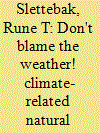| Srl | Item |
| 1 |
ID:
125908


|
|
|
|
|
| Publication |
2013.
|
| Summary/Abstract |
This article undertakes an empirical test of the proposition that natural disasters increase the risk of violent conflict. Climate change is expected to increase the risk of natural disasters, and India has been pointed to as being particularly at risk. State-level data from India for the period 1956-2002 are used to assess quantitatively whether climate-related natural disasters in India have contributed to increased rates of riots and politically motivated violence. The results indicate that disasters increase the risk of riots where literacy levels are high, and politically motivated violence where literacy levels are low. However, although statistically significant, the effect in both cases is so weak that it requires exceptional circumstances for disasters to have any substantially important impact.
|
|
|
|
|
|
|
|
|
|
|
|
|
|
|
|
| 2 |
ID:
110812


|
|
|
|
|
| Publication |
2012.
|
| Summary/Abstract |
The issue of climate change and security has received much attention in recent years. Still, the results from research on this topic are mixed and the academic community appears to be far from a consensus on how climate change is likely to affect stability and conflict risk in affected countries. This study focuses on how climate-related natural disasters such as storms, floods, and droughts have affected the risk of civil war in the past. The frequency of such disasters has risen sharply over the last decades, and the increase is expected to continue due to both climate change and demographic changes. Using multivariate methods, this study employs a global sample covering 1950 to the present in order to test whether adding climate-related natural disasters to a well-specified model on civil conflict can increase its explanatory power. The results indicate that this is the case, but that the relation is opposite to common perceptions: Countries that are affected by climate-related natural disasters face a lower risk of civil war. One worrying facet of the claims that environmental factors cause conflict is that they may contribute to directing attention away from more important conflict-promoting factors, such as poor governance and poverty. There is a serious risk of misguided policy to prevent civil conflict if the assumption that disasters have a significant effect on war is allowed to overshadow more important causes.
|
|
|
|
|
|
|
|
|
|
|
|
|
|
|
|